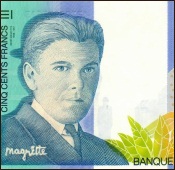Always Look on the Dark Side of Life
 Prior to the advent of the Euro, I lived in the Netherlands and then Belgium. I clearly recall how the money looked: the Dutch Guilder was always emblazoned on beautiful banknotes, each denomination a magnificent manifestation of national probity and pride. My mind’s eye is particularly drawn to the 50 guilder note, notable for featuring a bright yellow sunflower. I also thought the Belgian Franc was a particularly noble currency; the 500 franc note remains my favourite piece of numismatic art as it bears the portrait of Rene Magritte and contains a tribute to his work. I wish I had kept one; I would have tucked it safely in my wallet along with my Hong Kong dollar and Jersey pound notes as a souvenir of my travels.
Prior to the advent of the Euro, I lived in the Netherlands and then Belgium. I clearly recall how the money looked: the Dutch Guilder was always emblazoned on beautiful banknotes, each denomination a magnificent manifestation of national probity and pride. My mind’s eye is particularly drawn to the 50 guilder note, notable for featuring a bright yellow sunflower. I also thought the Belgian Franc was a particularly noble currency; the 500 franc note remains my favourite piece of numismatic art as it bears the portrait of Rene Magritte and contains a tribute to his work. I wish I had kept one; I would have tucked it safely in my wallet along with my Hong Kong dollar and Jersey pound notes as a souvenir of my travels.
When I lived there, Belgium and the Netherlands were both in the process of preparing for the Euro. I recall the widespread enthusiasm; in both Amsterdam and Antwerp, dual pricing crept in, even though the new money hadn’t yet arrived. If I remember correctly, some stores had signs posted in their windows stating proudly that they were ready for the change. The mood was bullish: why, with a single currency, it would become much easier for the Belgians, the Dutch, the French, the Germans and the Italians to trade. Pricing would be transparent; it would remove the problems associated with currency fluctuations and arbitrage. Yes, some admitted, it wouldn’t be all a bed of roses: without being able to devalue, one of the key strategies Mediterranean economies had used hitherto to regain competitiveness would be lost to them. But never mind, after the adjustment, we’ll all be as rich as Germans, they thought; the Euro was seen as a magic elixir which would cure the sins of inflation, mismanagement, low productivity and corruption. The markets breathed in the same heady atmosphere: they loaned money to Greece at similar rates as they did to the Germans.
As we all now know, this optimism was misplaced. The books were cooked. A new currency wasn’t accompanied by a renewed sense of responsibility. The Germans became more competitive because their efficient economy was hitched to a keenly priced currency; however Italy, Spain, Greece and Portugal all found that it’s easier to use German money than it is to emulate the German economic model. People believed ridiculous things like the housing market in Dublin would always go up: a fatal assumption. And now we are on the edge of the precipice, waiting until June 17th and the second Greek election, hoping that some sort of resolution will take place: will we see Greek banknotes, bearing the likeness of King Philip of Macedonia, once more? Or will Greece swallow ever more bitter medicine? What price will we pay for having been so optimistic? Will this lead to the collapse of economies? Governments? Whole societies?
 I am a curmudgeon; I am often accused by people near and dear to me of being “too grumpy”. “Cheer up,” I’m told. “Always look on the bright side of life,” is a cliché and a song I’m familiar with; the sentiment pervades so far that the anthem has made it to the football terraces across the land, and sometimes it’s even deployed at funerals. “Don’t worry, be happy”, Bobby McFerrin tells us. A popular logo featuring a yellow smiling face advises us to “Have a Nice Day”. In contrast, Oscar the Grouch on “Sesame Street” is shown to be an unpleasant character, who invites visitors to “scram”. To be grumpy is to invite opprobrium, to be called a “killjoy” or “buzz killer”. However I recall a saying a teacher once told me: “The difference between an optimist and a pessimist is that the pessimist is better informed.” Had there been more analysis of the downside risks associated with the Euro, if people had thought about the bad as well as the good that would flow from it, perhaps we wouldn’t be in the current crisis. Pessimistic people are vital in order to ensure that a valid analysis of the hazards takes place: otherwise people have a tendency to float off on clouds of fancy and fantasy which lead them to eventual disaster.
I am a curmudgeon; I am often accused by people near and dear to me of being “too grumpy”. “Cheer up,” I’m told. “Always look on the bright side of life,” is a cliché and a song I’m familiar with; the sentiment pervades so far that the anthem has made it to the football terraces across the land, and sometimes it’s even deployed at funerals. “Don’t worry, be happy”, Bobby McFerrin tells us. A popular logo featuring a yellow smiling face advises us to “Have a Nice Day”. In contrast, Oscar the Grouch on “Sesame Street” is shown to be an unpleasant character, who invites visitors to “scram”. To be grumpy is to invite opprobrium, to be called a “killjoy” or “buzz killer”. However I recall a saying a teacher once told me: “The difference between an optimist and a pessimist is that the pessimist is better informed.” Had there been more analysis of the downside risks associated with the Euro, if people had thought about the bad as well as the good that would flow from it, perhaps we wouldn’t be in the current crisis. Pessimistic people are vital in order to ensure that a valid analysis of the hazards takes place: otherwise people have a tendency to float off on clouds of fancy and fantasy which lead them to eventual disaster.
Despite Athens burning, today is yet another day in which optimism is going to take hold; Facebook’s shares will make their stock market début. The company’s current value is estimated at $104 billion. This makes sense from a certain point of view: one of the key problems facing manufacturers and retailers is how to effectively market themselves. At the moment, their approaches are far too haphazard: one can more or less assume that someone watching “Top Gear” on the Dave channel may be interested in car-related products, but what about those who watch murder mysteries? Or people who read a daily newspaper? Market research can help, but it is like throwing a bucket of water over a large crowd, hoping that one or two people will get particularly soaked. Facebook, in contrast, has a vast amount of data about individuals: their age, location, education, profession, family size, relationship status. Theoretically, an advertiser looking to sell, say, a family sized car, could ring up Facebook and target their marketing much more effectively. This could be immensely valuable, furthermore, it might spell the end of advertising as we know it.
On the other hand, what is Facebook’s purpose? When it was founded, it was merely thought of as a means of communication for old friends to keep in touch; this ethos has filtered down to those who use it. So, when someone is utilising Facebook, they are unlikely to be in the same frame of mind as they would be when they go shopping. Google is successful because it catches users at a point at which they are searching for something; the liklihood of finding someone who is in “shopping mode” is much greater. If Facebook and Google found a way to work together, then that might be a fantastic business prospect, a world beater. But $104 billion? On its own? Really?
I have only heard very limited and muted concerns of this type, tucked discreetly away in the middle of early morning business programmes. Rather like with the Euro, traders are already minting Facebook share certificates in their mind, and if the markets are to be believed, these shares are worth much more than their weight in gold. We’ve been here before not just with the Euro but also with dot com bubbles and property bubbles and belief that Enron shares were worth more than sheets of Kleenex. We go through this again and again and again and the sceptics and curmudgeons are told: “Don’t worry, be happy.” “Always look on the bright side of life.” and “Have a nice day.” One wonders when the Nouriel Roubinis and Vince Cables of this world will get a look in before the disaster ensues. How many more lives and nations have to be ruined before we start looking at matters with clear eyes?
We may be at a point at which such focus will come; however, I suggest that it will be temporary. Nothing lasts forever, not even bad times. Some new technology will arrive or some new market will be tapped: perhaps the recent plans to gather valuable minerals from asteroids will be a prelude to the next big thing. The engine of optimism will whirr to life again. At first, confidence will be hesitant, and the grouches and grumps will still have a say in discussions; but knowing people and their downside risks, there will come a point that the dissenters will be ignored as optimism creates its own unstoppable momentum towards its doom. It’s then we will truly need to be worried and prepare for the inevitable crash. And then after that, still no one will sing, “Always look on the dark side of life.”


